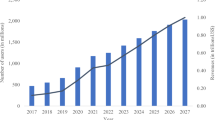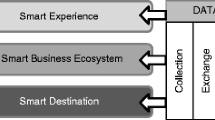Abstract
From the moment e-shopping emerged, there have been speculations about its impact on personal mobility. A fair amount of research has already been carried out on Internet shopping itself as well as on its consequences for mobility. Most studies focus on the overall impact of online shopping on personal mobility. However, little is known about how personal shopping mobility can be characterised when differentiating its constituent stages, being browsing/orienting, comparing, selecting and purchasing products, and how this is affected by e-shopping. This will be the main topic of this paper. We will investigate this using recently collected data from the Netherlands Mobility Panel [in Dutch: MobiliteitsPanel Nederland (MPN)]. It is the unique combination of reported shopping trips in the three-day travel diary, the large amount of personal and household characteristics combined with the detailed information from the e-shopping questionnaire that enables us to perform this research. Using factor analysis, we explore the underlying factors related to the browsing and selection behaviour prior to the purchase of a product. Using these factors as a starting point, we apply cluster analysis resulting in three homogeneous groups of shoppers with different pre-purchase shopping behaviour. The groups differ clearly with respect to personal and household characteristics, in the frequency with which they buy and sell products online and in their perception of (dis-)advantages of online shopping. Once relevant groups have been distinguished and characterised, differences in shopping-related mobility between them are studied in two different ways. Firstly, we analyse statements from shoppers on how their shopping-related mobility has changed. Secondly, we analyse shopping trips reported in the three-day travel diary. Only one group, which consists of shoppers that rely on the Internet to search for product information, compare prices and get new product ideas, states that their shopping-related travel behaviour has changed since they started shopping online. Approximately 50% of all shoppers experienced no difference in their shopping mobility. The analysis of actual shopping mobility using the travel diary data showed only minor differences in shopping-related travel behaviour between the identified groups. Finally, we fit a multi-variate linear regression model of shopping trip distance to determine if (e)-shopping characteristics influence trip distances. The frequency with which people shop online as well as some stated changes in shopping-related travel behaviour (shopping in a similar manner and shopping longer) turn out to influence non-grocery shopping trip distance. No significant influence could be found of shopping cluster membership on shopping trip distances.


Similar content being viewed by others
References
Alba, J., Lynch, J., Weitz, B., Janiszewski, C., Lutz, R., Sawyer, A., Wood, S.: Interactive home shopping: consumer, retailer, and manufacturer incentives to participate in electronic marketplaces. J. Mark. 61, 38–53 (1997)
Boschma, R.A., Weltevreden, J.W.J.: B2c e-commerce adoption in inner cities: an evolutionary perspective. Working Paper 05.03. Papers in Evolutionary Economic Geography (PEEG), Utrecht University, Utrecht (2005)
Cao, X., Xu, Z., Douma, F.: The interactions between e-shopping and traditional in-store shopping: an application of structural equations model. Transportation 39, 1–18 (2012)
Casas, J., Zmud, J., Bricka, S.: Impact of shopping via Internet on travel for shopping purposes. In: CD Proceedings of the 80th Annual Meeting of the Transportation Research Board, Washington, DC (2001)
Couclelis, H.: Pizza over the Internet: e-commerce, the fragmentation of activity and the tyranny of the region. Entrep. Reg. Dev. 16(1), 41–54 (2004)
Currah, A.: Behind the web store: the organisational and spatial evolution of multi-channel retailing in Toronto. Environ. Plann. A 34(8), 1411–1441 (2002)
Cushman & Wakefield: Global Perspective on Retail: Online Retailing. Cushman & Wakefield, London (2012)
Dixon, T., Marston, A.D.: UK retail real estate and the effects of online shopping. J. Urban Technol. 9(3), 19–47 (2002)
Europe, Ecommerce: European B2C E-Commerce Report 2014. Ecommerce Europe, Brussels (2014)
Farag, S., Weltevreden, J.W.J., van Rietbergen, T., Dijst, M., van Oort, F.: E-shopping in the Netherlands: does geography matter? Environ Plan 33(1), 59–74 (2006a)
Farag, S.: E-shopping and its interactions with in-store shopping. Ph.D. thesis, Utrecht University, The Netherlands (2006)
Farag, S., Krizek, K.J., Dijst, M.: E-shopping and its relationship with in-store shopping: empirical evidence from the Netherlands and the USA. Transp. Rev. 26, 43–61 (2006b)
Farag, S., Schwanen, T., Dijst, M., Faber, J.: Shopping online and/or in-store? A structural equation model of the relationships between e-shopping and in-store shopping. Transp. Res. A Policy Pract. 41(2), 125–141 (2007)
Giout, D., Roux, D.: A second-hand shoppers motivation scale: antecedents, consequences, and implications for retailers. J Retail 86(4), 383–399 (2010)
Harms, L.W.J.: Overwegend Onderweg: De Leefsituatie en de Mobiliteit van Nederlanders. Universiteit Utrecht, Utrecht (2008)
Hoogendoorn-Lanser, S., Schaap, N., Olde Kalter, M.-J.: The Netherlands Mobility Panel: an innovative design approach for web-based longitudinal travel data collection. In: 10th International Conference on Transport Survey Methods, Transportation Research Procedia, vol. 11, pp. 311–329 (2015)
I&O Research: Randstad Koopstromenonderzoek 2011—Main Report (2011)
Kenyon, S.: The impacts of Internet use upon activity participation and travel: results from a longitudinal diary-based panel study’. Transp. Res. C Emerg. Technol. 18(1), 21–35 (2010)
KiM: http://www.kimnet.nl/sites/kimnet.nl/subsites/mobiliteitsbeeld-2014/index.html (2014). Accessed 15 May 2015
Levin, A.M., Levin, I.P., Weller, J.A.: A multi-attribute analysis of preferences for online and offline shopping: differences across products, consumers, and shopping stages. J. Electron. Commer. Res. 6(4), 281–290 (2005)
Lynch, J.G., Ariely, D.: Wine online: search costs affect competition on price, quality and distribution. Mark. Sci. 19, 83–103 (2000)
Mokhtarian, P.L.: A conceptual analysis of the transportation impacts of b2c e-commerce. Transportation 31(3), 257–284 (2004)
Novak, T.P., Hoffman, D.L., Duhachek, A.: The influence of goal-directed and experiential activities on online flow experiences. J. Consum. Psychol. 13(1–2), 3–16 (2003)
Olde Kalter, M.J.T., Geurs, K.T., Hoogendoorn-Lanser, S, van Beek, P: Mode-choice behaviour for home-based work trips: The fitst results of the new Netherlands Mobility Panel. In: Paper presented at the 10th International Conference on Survey Methods in Transport, Leura, Australia (2014)
Park, E.J., Kim, E.Y., Funches, V.M., Foxx, W.: Apparel product attributes, web browsing, and e-impulse buying on shopping websites. J Bus Res 65(11), 1583–1589 (2012)
Rohm, A.J., Swaminathan, V.: A typology of online shoppers based on shopping motivations. J Bus Res 57, 748–757 (2004)
Rotem-Mindali, O., Salomon, I.: The impacts of E-retail on the choice of shopping trips and delivery: some preliminary findings. Transp. Res. A Policy Pract. 41(2), 176–189 (2007)
Rotem-Mindali, O., Weltevreden, J.W.J.: Transport effects of e-commerce: what can be learned after years of research? Transportation 40(5), 867–885 (2013)
Rowley, J.: Product search in e-shopping: a review and research propositions. J. Consum. Mark. 17(1), 20–35 (2000)
Shaw, E.: The utility of the four utilities concept. Res. Mark. Suppl. 6, 47–66 (1994)
Statistics Netherlands: ICT, Knowledge and Economy. Statistics Netherlands, The Hague (2014)
Statistics Netherlands: CBS-Statline: http://statline.cbs.nl/statweb/ (2014b). Accessed 1 Sept 2016
Statistics Netherlands: CBS-Statline: http://statline.cbs.nl/statweb/ (2014c). Accessed 1 Sept 2016
Steinfield, C., De Wit, D., Adelaar, T., Bruins, A., Fielt, E., Hoefsloot, M., Smit, A., Bouwman, H.: Pillars of virtual enterprise: leveraging traditional assets in the new economy. Info 3, 203–213 (2001)
Stevens, J.: Applied Multi-variate Statistics for the Social Sciences. Lawrence Erlbaum Associates, New Jersey (2002)
Tonn, B.E., Hemrick, A.: Impacts of the use of e-mail and the Internet on personal trip-making behaviour. Soc. Sci. Comput. Rev. 22, 270–280 (2004)
Ward, M.R., Morganowsky, M.: Consumer acquisition of product information and subsequent purchase channel decisions. Econ. Internet E-commer. 11, 231–255 (2002)
Ward, M.R.: Will online shopping compete more with traditional retailing or catalog shopping? Netnomics 3, 103–117 (2001)
Weltevreden, J.W.J.: Winkelen in het Internettijdperk. Ruimtelijk Planbureau, Den Haag (2007)
Wolfinbarger, M., Gilly, M.C.: Shopping online for freedom, control, and fun. Calif Manag Rev 43(2), 34–55 (2001)
Yamamoto, H., Ishida, K., Ohta, T.: Modelling reputation management system on online c2c market. Comput. Math. Organ. Theory 10, 165–178 (2004)
Author information
Authors and Affiliations
Corresponding author
Additional information
Publisher's Note
Springer Nature remains neutral with regard to jurisdictional claims in published maps and institutional affiliations.
Rights and permissions
About this article
Cite this article
Hoogendoorn-Lanser, S., Olde Kalter, MJ. & Schaap, N.T.W. Impact of different shopping stages on shopping-related travel behaviour: analyses of the Netherlands Mobility Panel data. Transportation 46, 341–371 (2019). https://doi.org/10.1007/s11116-019-09993-7
Published:
Issue Date:
DOI: https://doi.org/10.1007/s11116-019-09993-7




